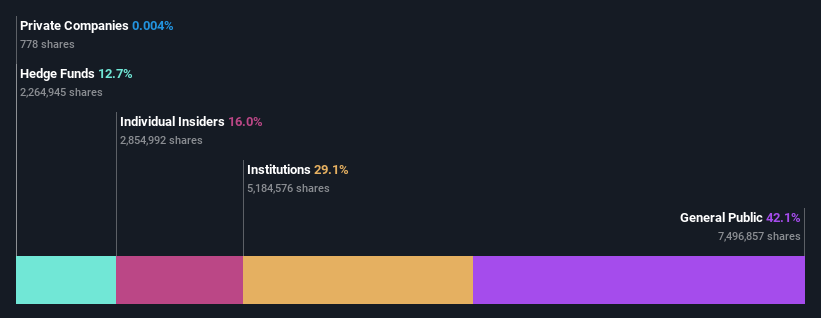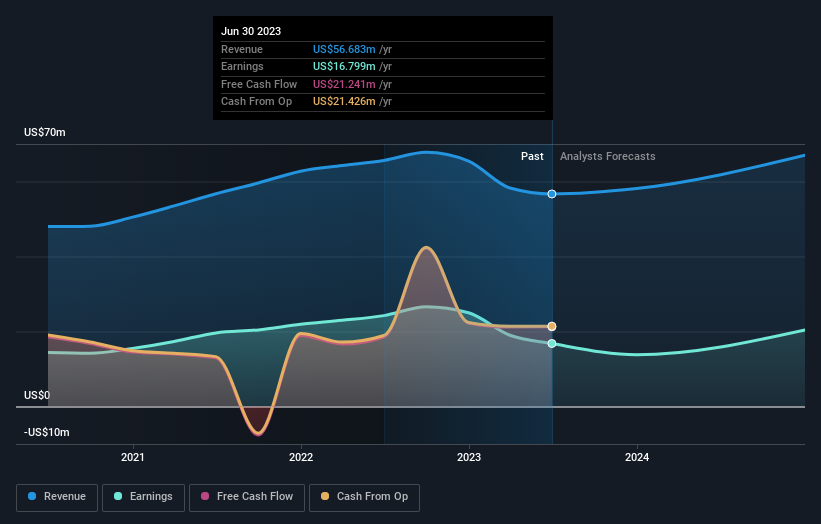Retail investors account for 42% of FVCBankcorp, Inc.'s (NASDAQ:FVCB) ownership, while institutions account for 29%
Key Insights
The considerable ownership by retail investors in FVCBankcorp indicates that they collectively have a greater say in management and business strategy
A total of 21 investors have a majority stake in the company with 50% ownership
To get a sense of who is truly in control of FVCBankcorp, Inc. (NASDAQ:FVCB), it is important to understand the ownership structure of the business. And the group that holds the biggest piece of the pie are retail investors with 42% ownership. In other words, the group stands to gain the most (or lose the most) from their investment into the company.
Meanwhile, institutions make up 29% of the company’s shareholders. Generally speaking, as a company grows, institutions will increase their ownership. Conversely, insiders often decrease their ownership over time.
Let's take a closer look to see what the different types of shareholders can tell us about FVCBankcorp.
View our latest analysis for FVCBankcorp
What Does The Institutional Ownership Tell Us About FVCBankcorp?
Many institutions measure their performance against an index that approximates the local market. So they usually pay more attention to companies that are included in major indices.
We can see that FVCBankcorp does have institutional investors; and they hold a good portion of the company's stock. This implies the analysts working for those institutions have looked at the stock and they like it. But just like anyone else, they could be wrong. When multiple institutions own a stock, there's always a risk that they are in a 'crowded trade'. When such a trade goes wrong, multiple parties may compete to sell stock fast. This risk is higher in a company without a history of growth. You can see FVCBankcorp's historic earnings and revenue below, but keep in mind there's always more to the story.
Our data indicates that hedge funds own 13% of FVCBankcorp. That worth noting, since hedge funds are often quite active investors, who may try to influence management. Many want to see value creation (and a higher share price) in the short term or medium term. Looking at our data, we can see that the largest shareholder is Endeavour Capital Advisors Inc. with 7.0% of shares outstanding. With 5.7% and 5.5% of the shares outstanding respectively, FJ Capital Management, LLC and Nino Vaghi are the second and third largest shareholders. In addition, we found that David Pijor, the CEO has 2.5% of the shares allocated to their name.
A closer look at our ownership figures suggests that the top 21 shareholders have a combined ownership of 50% implying that no single shareholder has a majority.
While studying institutional ownership for a company can add value to your research, it is also a good practice to research analyst recommendations to get a deeper understand of a stock's expected performance. There is a little analyst coverage of the stock, but not much. So there is room for it to gain more coverage.
Insider Ownership Of FVCBankcorp
While the precise definition of an insider can be subjective, almost everyone considers board members to be insiders. The company management answer to the board and the latter should represent the interests of shareholders. Notably, sometimes top-level managers are on the board themselves.
I generally consider insider ownership to be a good thing. However, on some occasions it makes it more difficult for other shareholders to hold the board accountable for decisions.
Our information suggests that insiders maintain a significant holding in FVCBankcorp, Inc.. Insiders own US$33m worth of shares in the US$208m company. It is great to see insiders so invested in the business. It might be worth checking if those insiders have been buying recently.
General Public Ownership
The general public-- including retail investors -- own 42% stake in the company, and hence can't easily be ignored. While this size of ownership may not be enough to sway a policy decision in their favour, they can still make a collective impact on company policies.
Next Steps:
It's always worth thinking about the different groups who own shares in a company. But to understand FVCBankcorp better, we need to consider many other factors. Consider risks, for instance. Every company has them, and we've spotted 1 warning sign for FVCBankcorp you should know about.
If you are like me, you may want to think about whether this company will grow or shrink. Luckily, you can check this free report showing analyst forecasts for its future.
NB: Figures in this article are calculated using data from the last twelve months, which refer to the 12-month period ending on the last date of the month the financial statement is dated. This may not be consistent with full year annual report figures.
Have feedback on this article? Concerned about the content? Get in touch with us directly. Alternatively, email editorial-team (at) simplywallst.com.
This article by Simply Wall St is general in nature. We provide commentary based on historical data and analyst forecasts only using an unbiased methodology and our articles are not intended to be financial advice. It does not constitute a recommendation to buy or sell any stock, and does not take account of your objectives, or your financial situation. We aim to bring you long-term focused analysis driven by fundamental data. Note that our analysis may not factor in the latest price-sensitive company announcements or qualitative material. Simply Wall St has no position in any stocks mentioned.


